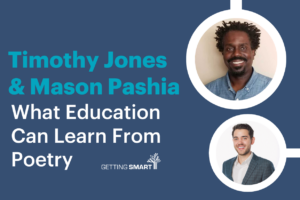Why Parents Should Support Student-Centered Learning

Nicholas C. Donohue
Our education system was designed for an era that no longer exists. Our world is changing rapidly, and this has profound implications for how our young people learn. Formal and informal learning options abound. As opportunities and options explode, families are faced with unprecedented amounts of decisions related to education.
As parents, we know now that a high school diploma is no longer an indicator of future success. Today’s students must leave high school prepared for success in post-secondary schooling or training. Our students must also be equipped with skills such as creativity, communication, critical thinking, and collaboration, new basics if you will for a modern age.
My own daughters are very successful in the traditional system, but I share concerns with other parents about how they are being challenged to exercise their minds and grow the real practical skills needed to succeed. One approach being promoted nationally to address these concerns is to renovate our education systems to deliver student-centered approaches to learning, sometimes known more simply as personalized learning. These approaches are built on research and the science of learning and are aimed at elevating outcomes and broadening the fit of public education to a wider variety of learners with a wider variety of preferences, strengths and needs.
What is Student-Centered Learning?
For starters, we envision an education system where learning transcends the traditional school calendar and setting. We envision a system where student progress is based upon mastery of a skill or topic, rather than time spent in a classroom: one that is feasibly customized in practical, cost effective ways that garner results strong enough to predict future success in life and work.
We know parents play a huge role in implementing the principles of student-centered learning, learning that is personalized, engaging, competency-based and happens anytime, anywhere.
Student-centered learning engages students in their own success, and incorporates their interests and skills into the learning process. Rather than having educators hand down information, students can interact with teachers and their peers in real-time – preparing them to be successful in college and career. Beyond college and career readiness, there is a real desire to prepare our young people to be life-long learners. This means not just thinking about whether they can enter the 21st century economy, but also if they love to learn, have empathy for others and are actively engaged citizens.
What are Student-Centered Approaches?
Student-centered approaches to learning highlight four key tenets, drawn from the mind/brain sciences, learning theory, and research on youth development that are essential to students’ full engagement in achieving deeper learning outcomes:
Learning is Personalized: Personalized learning recognizes that students engage in different ways and in different places. Students benefit from individually-paced, targeted learning tasks that start from where the student is, formatively assess existing skills and knowledge, and address the student’s needs and interests.
Learning is Competency-Based: Students move ahead when they have demonstrated mastery of content, not when they’ve reached a certain birthday or endured the required hours in a classroom.
Learning Happens Anytime, Anywhere: Learning takes place beyond the traditional school day, and even the school year. The school’s walls are permeable – learning is not restricted to the classroom.
Students Take Ownership Over Their Learning: Student-centered learning engages students in their own achievements, and incorporates their interests and skills into the learning process.
For my eighth grader, this would mean building on her strong interests around math but making it more practical and real-world oriented, like asking her to do presentations or solve real-world problems based on theoretical constructs. Math can be used to describe the world in the same way literature does, but only if its delivery shows how it can be applied practically or makes transparent how “thinking through math” enriches analytic skills necessary for lots of related tasks.
For my 19-year-old, this could have meant tapping her 4.75 GPA attaining habits with her love for theater in ways that would have made the latter more central, rather than being subjugated as an elective option so different from “regular school.”
More importantly, for their friends, just as interested in succeeding as my own daughters, but for whom traditional school is much harder, this could mean giving them more varied and appropriate chances to apply their grit, dig deep, work hard, exercise skills that they will need to succeed in the real world, and achieve at high levels. My girls were going to succeed despite the current approaches for lots of reasons. For many others the deck needs to be restacked, not to make things easier or more fun, but to make them more fair. We need to align how we educate our students with what we know about how people learn, rather than organizing education as a one-size-fits-all endurance test with too few seats in college as the gold ring.
We need to make this move as a society because the future of our communities, our children, our grandchildren and their neighbors depends on it. The time has passed for a 19th century system that picks the winner. We need a 21st century system that prepares learners.
One question people ask me regularly is: “Given that your own children are successful in the current system, would you support their participation in a student-centered learning environment?” The answer is an unqualified “yes!” I answer this way in part because I spend my working life trying to understand these approaches and have reconciled costs with outcomes.
The costs include giving up class rank. My 19-year-old was placed 5th out of 500 in her class. I liked that. So do they. My 14-year-old is headed toward the same single digit position, who wouldn’t want the same for her? But this kind of comparative accomplishment suggests they are better than most; however, they might actually be ready to take on greater educational challenges. Instead of simply looking at class rank, a better measure might show that they were really competent in important things and truly ready for what comes next.
This conclusion is bolstered by emerging research that suggests that valedictorians don’t necessarily fare well in college and the workplace in part because although they are game winners, they may have trouble thinking outside of the box. This explains in part why colleges want “well-rounded” applicants. They know that breadth of experience, skills and knowledge is not tied to simply tested outcomes.
But my “expert” perspective is outweighed by my daughters’ pleas. “What’s taking you so long?!?! Fix the schools!!!” They don’t like the idea that a student-centered future might be more rigorous, or that a group of kids might get A’s because they have mastered the material. But they do like the idea that they can “think” and be their full selves during school as well as before and after it.
At The Nellie Mae Education Foundation, where I am President & CEO, we have partnered with Getting Smart, a learning design firm, to tell compelling parent stories in the Smart Parents blog series on Getting Smart and The Huffington Post, and in the new book, Smart Parents: Parenting for Powerful Learning by Bonnie Lathram, Carri Schneider and Tom Vander Ark.
The Smart Parents blog series and book offer a powerful vision for what education must become. It is a compelling call to action and a practical road map for any parent, guardian or educator. The future of learning will mean that students are increasingly in the driver’s seat. This book inspires and informs and is a must read for anyone who wants to engage young people in the process of their own learning.
We hope you will advocate for student-centered learning, at home, in schools, and everywhere in between. We need parents involved in schools, recognizing and advocating for student-centered learning, for and with their students.
This blog is part of our Smart Parents blog series and book, Smart Parents: Parenting for Powerful Learning in partnership with The Nellie Mae Education Foundation. For more information, please see our Smart Parents: Parenting for Powerful Learning page and other blogs in the series:
- Organized Parents Can Transform Education-Indeed, We Can’t Do it Without Them
- Why Cultivating Nonconformity is More Important Than Ever
- Parental Involvement in Schools Matters: A Teacher’s Perspective
Nicholas C. Donohue is President and CEO of The Nellie Mae Education Foundation.





0 Comments
Leave a Comment
Your email address will not be published. All fields are required.